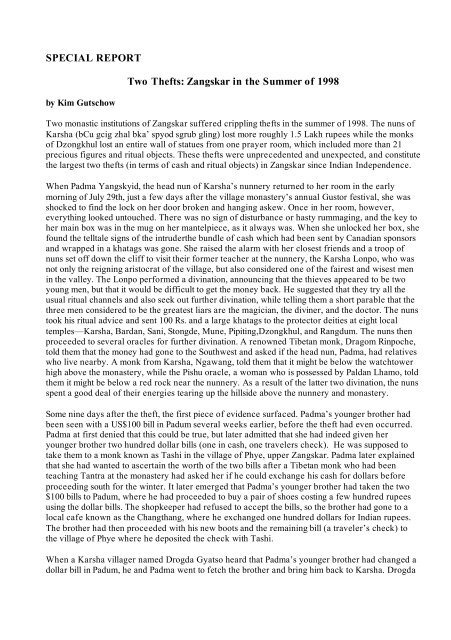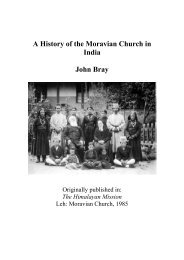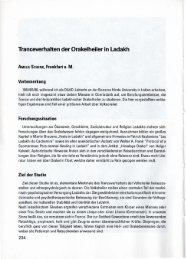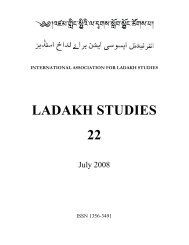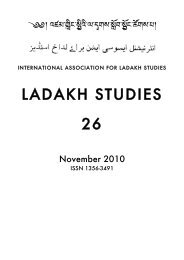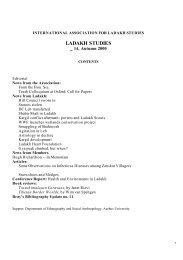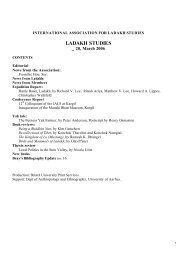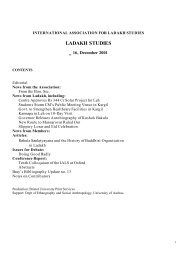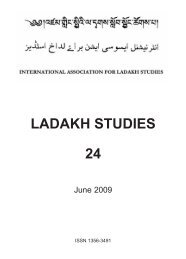LADAKH STUDIES 12, Autumn 1999 - International Association for ...
LADAKH STUDIES 12, Autumn 1999 - International Association for ...
LADAKH STUDIES 12, Autumn 1999 - International Association for ...
You also want an ePaper? Increase the reach of your titles
YUMPU automatically turns print PDFs into web optimized ePapers that Google loves.
SPECIAL REPORT<br />
by Kim Gutschow<br />
Two Thefts: Zangskar in the Summer of 1998<br />
Two monastic institutions of Zangskar suffered crippling thefts in the summer of 1998. The nuns of<br />
Karsha (bCu gcig zhal bka’ spyod sgrub gling) lost more roughly 1.5 Lakh rupees while the monks<br />
of Dzongkhul lost an entire wall of statues from one prayer room, which included more than 21<br />
precious figures and ritual objects. These thefts were unprecedented and unexpected, and constitute<br />
the largest two thefts (in terms of cash and ritual objects) in Zangskar since Indian Independence.<br />
When Padma Yangskyid, the head nun of Karsha’s nunnery returned to her room in the early<br />
morning of July 29th, just a few days after the village monastery’s annual Gustor festival, she was<br />
shocked to find the lock on her door broken and hanging askew. Once in her room, however,<br />
everything looked untouched. There was no sign of disturbance or hasty rummaging, and the key to<br />
her main box was in the mug on her mantelpiece, as it always was. When she unlocked her box, she<br />
found the telltale signs of the intruderthe bundle of cash which had been sent by Canadian sponsors<br />
and wrapped in a khatags was gone. She raised the alarm with her closest friends and a troop of<br />
nuns set off down the cliff to visit their <strong>for</strong>mer teacher at the nunnery, the Karsha Lonpo, who was<br />
not only the reigning aristocrat of the village, but also considered one of the fairest and wisest men<br />
in the valley. The Lonpo per<strong>for</strong>med a divination, announcing that the thieves appeared to be two<br />
young men, but that it would be difficult to get the money back. He suggested that they try all the<br />
usual ritual channels and also seek out further divination, while telling them a short parable that the<br />
three men considered to be the greatest liars are the magician, the diviner, and the doctor. The nuns<br />
took his ritual advice and sent 100 Rs. and a large khatags to the protector deities at eight local<br />
temples—Karsha, Bardan, Sani, Stongde, Mune, Pipiting,Dzongkhul, and Rangdum. The nuns then<br />
proceeded to several oracles <strong>for</strong> further divination. A renowned Tibetan monk, Dragom Rinpoche,<br />
told them that the money had gone to the Southwest and asked if the head nun, Padma, had relatives<br />
who live nearby. A monk from Karsha, Ngawang, told them that it might be below the watchtower<br />
high above the monastery, while the Pishu oracle, a woman who is possessed by Paldan Lhamo, told<br />
them it might be below a red rock near the nunnery. As a result of the latter two divination, the nuns<br />
spent a good deal of their energies tearing up the hillside above the nunnery and monastery.<br />
Some nine days after the theft, the first piece of evidence surfaced. Padma’s younger brother had<br />
been seen with a US$100 bill in Padum several weeks earlier, be<strong>for</strong>e the theft had even occurred.<br />
Padma at first denied that this could be true, but later admitted that she had indeed given her<br />
younger brother two hundred dollar bills (one in cash, one travelers check). He was supposed to<br />
take them to a monk known as Tashi in the village of Phye, upper Zangskar. Padma later explained<br />
that she had wanted to ascertain the worth of the two bills after a Tibetan monk who had been<br />
teaching Tantra at the monastery had asked her if he could exchange his cash <strong>for</strong> dollars be<strong>for</strong>e<br />
proceeding south <strong>for</strong> the winter. It later emerged that Padma’s younger brother had taken the two<br />
$100 bills to Padum, where he had proceeded to buy a pair of shoes costing a few hundred rupees<br />
using the dollar bills. The shopkeeper had refused to accept the bills, so the brother had gone to a<br />
local cafe known as the Changthang, where he exchanged one hundred dollars <strong>for</strong> Indian rupees.<br />
The brother had then proceeded with his new boots and the remaining bill (a traveler’s check) to<br />
the village of Phye where he deposited the check with Tashi.<br />
When a Karsha villager named Drogda Gyatso heard that Padma’s younger brother had changed a<br />
dollar bill in Padum, he and Padma went to fetch the brother and bring him back to Karsha. Drogda<br />
14


